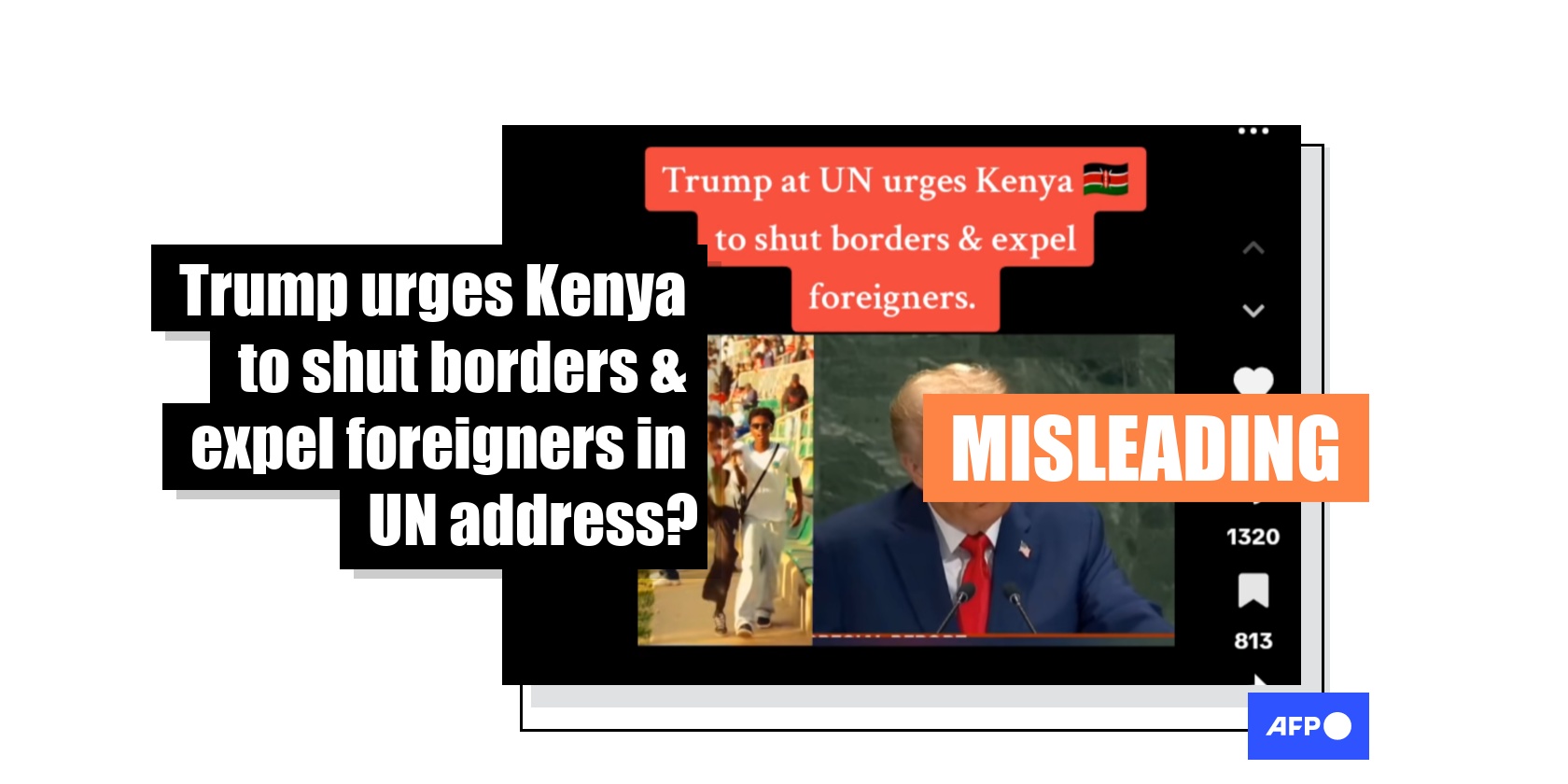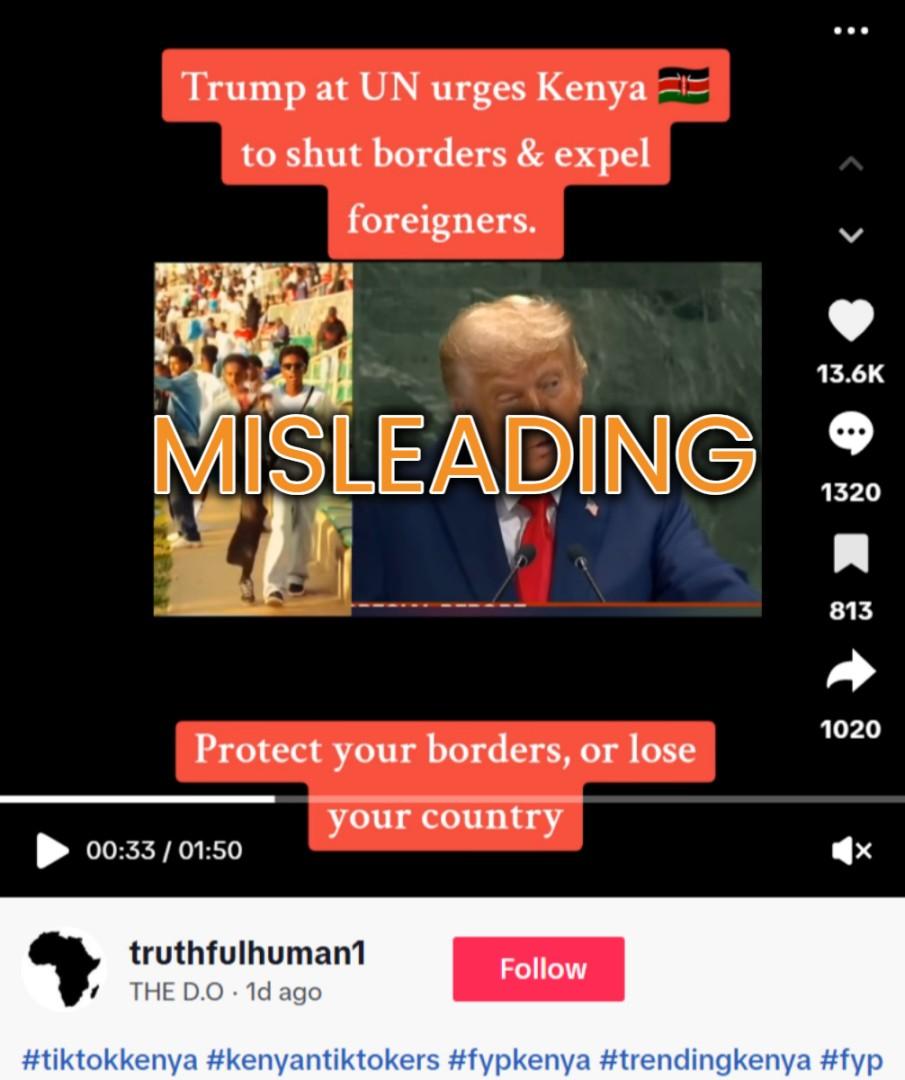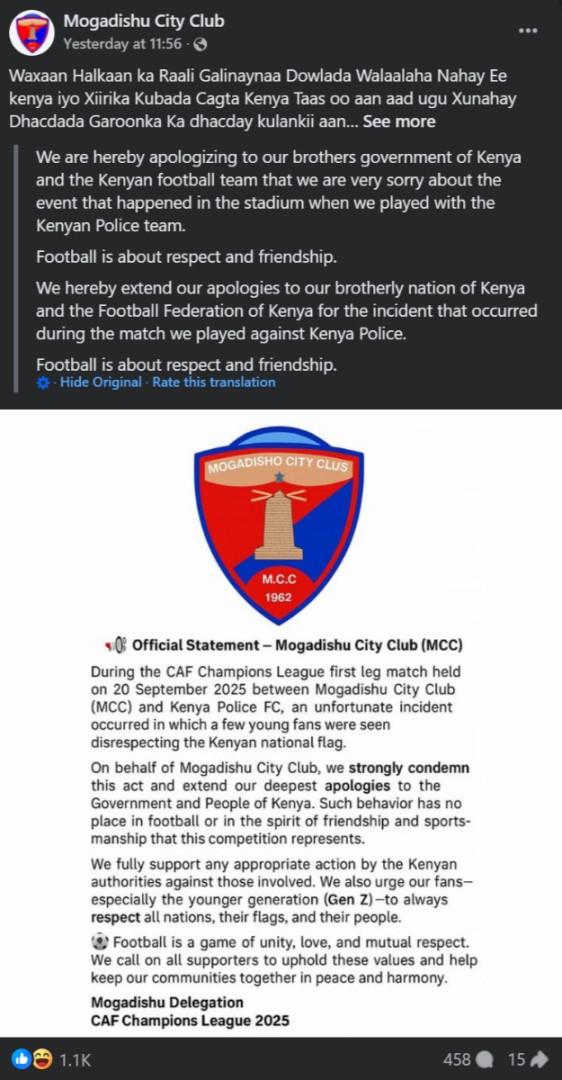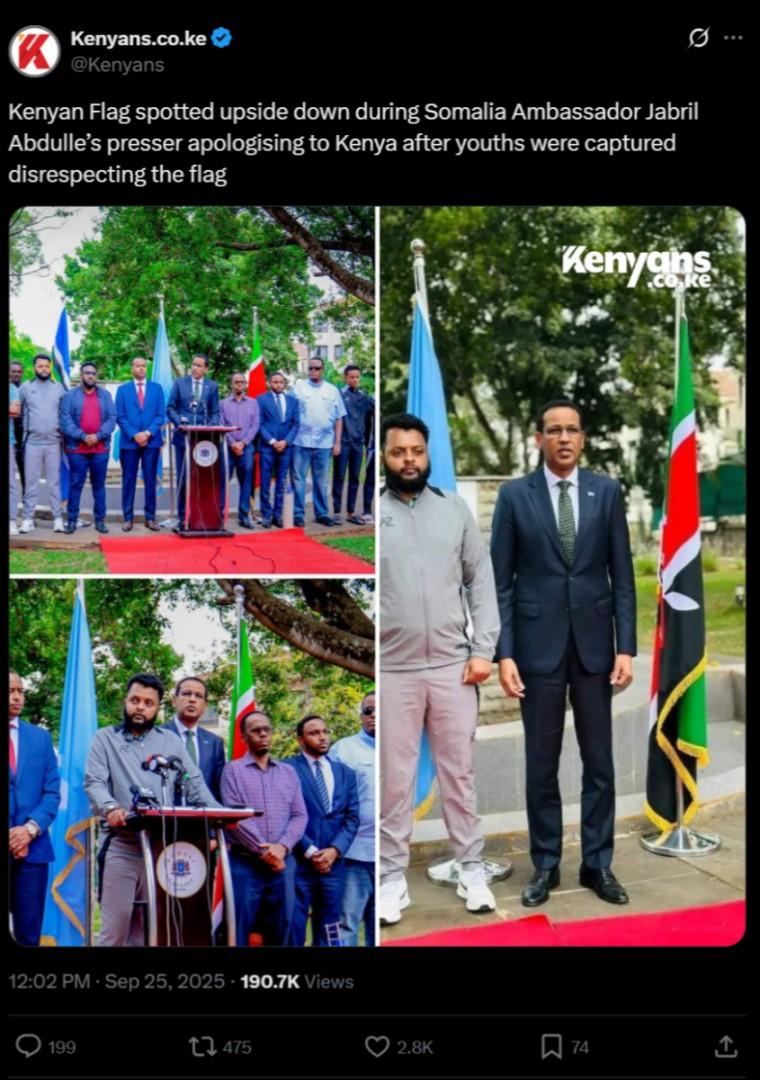
Trump’s UN remarks misrepresented in video on Somalia-Kenya match flag incident
- Published on September 30, 2025 at 09:42
- 5 min read
- By Peris GACHAHI, AFP Kenya
“Trump at UN urges Kenya to shut borders & expel foreigners (sic),” reads the text overlaid on a TikTok post published on September 24, 2025, and shared more than 1,000 times.
“Protect your borders or lose your country,” it says.

The video stitches together a clip of a Trump address with scenes from the match and screenshots of articles linking Somali nationals to past crimes in Kenya.
“The crisis of uncontrolled migration...Your countries are being ruined. I encourage all countries to take their own stand in defence of their citizens as well,” Trump is heard saying. “I’m not mentioning names. I can call every single one of them out. You’re destroying your countries”.
He adds that every sovereign nation must have “the right to control their own borders” and to limit migrant numbers.
Nations must prevent their communities from being “overwhelmed by people they have never seen before with different customs, religions, with different everything.”
As Trump speaks, clips show various fans abusing the Kenyan flag. They include a pair of young men, with one kicking the flag while the other grabs it mid-air and rubs it against his crotch.
The video ends with an advertisement for global remote job opportunities.
It surfaced after Somalia’s Mogadishu City Club lost to Kenya Police FC in a Confederation of African Football (CAF) Champions League preliminary match at Nairobi’s Nyayo Stadium on September 20. Following the game, footage emerged online showing Somalian fans desecrating the Kenyan flag, sparking anger (archived here).
These are the same clips seen in the TikTok video.
The incident came just days before Trump and other world leaders delivered their addresses at the 80th session of the UN General Assembly on September 23 (archived here).
However, the claim about Trump singling out Kenya is misleading.
Trump on migration
AFP Fact Check conducted reverse image searches on keyframes from the clip and found that the footage of Trump is indeed from his recent UN speech, where he talked about migration and open borders, among other issues (archived here).
“It’s time to end the failed experiment of open borders. I’m really good at this stuff. Your countries are going to hell,” he said, in addition to the excerpts used in the TikTok clip.
The US president also warned that Europe was “in serious trouble” over its immigration policies.
The only instance where Trump mentioned African countries was in reference to conflicts he claimed to have “ended” since his return to the White House.
“In a period of just seven months, I have ended seven unendable wars. Nobody could end them. It included all of them: Cambodia and Thailand, Kosovo and Serbia, Congo and Rwanda, Pakistan and India, Israel and Iran, Egypt and Ethiopia, and Armenia and Azerbaijan,” he said.
At no point did Trump mention Kenya or reference the stadium incident.
Kenya slams flag desecration
Meanwhile, Kenyan police chief Douglas Kanja condemned the desecration of the national flag and ordered the arrests of those involved (archived here).
“Our flag must be respected by everyone,” he said.
Interior secretary Kipchumba Murkomen warned that desecrating the flag is illegal in Kenya (archived here).
“Being in Kenya is a privilege. When you play around with instruments of national unity, you lose the privilege to live in our country,” he said.
Section 2B of the National Flag, Emblems and Names Act (Cap 99) states: “Any person who shows disrespect, in speech, manner or writing, to or with reference to the National Anthem, or to any specified emblem, specified likeness or specified name, or any representation thereof, shall be guilty of an offence and liable to a fine not exceeding five thousand shillings or to imprisonment for a term not exceeding six months, or to both such fine and such imprisonment.”
Somalia apologises
The Mogadishu City Club apologised for the actions of “a few young fans seen disrespecting the Kenyan national flag” (archived here).
“On behalf of Mogadishu City Club, we strongly condemn this act and extend our deepest apologies to the Government and People of Kenya,” it said in a statement on Facebook on September 24.
“Such behaviour has no place in football or in the spirit of friendship and sportsmanship that this competition represents.”
The club also pledged to support any action taken by Kenyan authorities against those involved and urged their fans to “respect all nations, their flags and their people”.

On the same day, Somalia’s ambassador to Kenya, Jabril Ibrahim Abdulle, also addressed the incident (archived here).
“Let me state clearly that we regret and firmly condemn the action of a few individuals whose behaviour overshadowed the remarkable performances of our two teams,” he said.
During Abdulle’s address, the Kenyan flag was displayed upside down a move that signals distress in international protocol (archived here).

This gaffe added to the outrage, with some Kenyans viewing it as another insult (archived here).
On September 26, two teenagers, aged 14 and 17, were arraigned in court in connection to the flag incident on charges of being in the country illegally, damaging a national symbol of unity and causing disturbance (archived here).
Somalis are the sixth-largest ethnic tribe in Kenya with a population of 2.7 million, according to the 2019 population and housing census report (archived here).
The TikTok video linking Trump’s UN speech on migration to the Nyayo Stadium flag incident taps into long-standing tensions over migration and national identity, whereby Somali nationals and Kenyan Somalis often face stereotyping, harassment, and profiling linked to national security and terrorism (archived here).
These attitudes are fuelled by the perception that Somalis are linked to the militant group Al-Shabaab, which has carried out deadly attacks in Kenya, reinforcing xenophobic narratives that cast the community as a security threat (archived here and here).
Copyright © AFP 2017-2026. Any commercial use of this content requires a subscription. Click here to find out more.
Is there content that you would like AFP to fact-check? Get in touch.
Contact us
